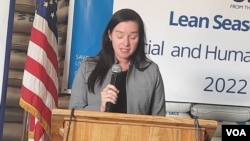Rutendo Mawere
The United States says it has stopped participating in a critical program for restructuring Zimbabwe’s US$17.7 billion debt due to lack of progress on democratic reforms, alleged voter fraud and political violence targeted at opposition parties.
But the ruling Zanu PF has dismissed America's move, saying it should stop meddling in the affairs of the southern African nation.
In an exclusive interview with VOA Zimbabwe Service, Chargé d'Affaires at the U.S. Embassy in Harare, Ms. Elaine French, said America paused its participation in the Zimbabwe Structured Dialogue Platform on Debt Clearance with creditors and development partners following President Emmerson Mnangagwa's government's failure to conduct free, fair and credible elections last year and the brutalization of opponents.
“In the dialogue the government of Zimbabwe committed to taking on reforms, but we haven’t seen the statements translating to actions especially when it comes to elections. We did not see those reforms before, during and after elections. Because of the poor conduct around 2023 elections the United States Mission Embassy had decided to press pause on our involvement in the AFDB dialogue.”
USA, the African Development Bank, representatives of the International Monetary Fund, World Bank, former Mozambican President Joaquim Chissano, Zimbabwean government and several others are part of the debt clearance program, which has so far seen the convening of four meetings in Harare in an attempt to clear an external debt of US$12.7 billion and internal debt amounting to US$5 billion.
Ms. French also said relations between Zimbabwe and USA remain strained due to lack of democratic reforms.
“Since the August 2023 elections and even before that, I would characterize the relationship as strained between Government of Zimbabwe and the U.S. partly due to lack of progress on democratic reforms on behalf of the government of Zimbabwe exemplified in the August 2023 elections.”
America imposed targeted sanctions on ruling party elite in 2003, citing human rights violations and electoral fraud. As of February 2020, there were 86 individuals and 56 companies on the sanctions list, including Sakunda Holdings, a business entity owned by Kudakwashe Tagwirei, a close associate of President Mnangagwa and his inner circle.
Tagwirei is accused of allegedly siphoning state funds through shady deals but he denies these accusations. French says lack of visible reforms demanded by the West over the years led to Zimbabwe's disputed elections last year. She says her nation is not happy over the outcome of the polls and the current political violence gripping Zimbabwe that has resulted in the death of an opposition activist.
“We are deeply disturbed by some of the events that have happened since elections in particular some of the violent acts against opposition members and their supporters some of which have been injured and others killed. Our message is very clear to the government of Zimbabwe. We urge them to take meaningful steps towards open accountable and democratic governance reforms.”
But the Zimbabwean government has dismissed French's remarks saying USA should stop meddling in the affairs of the African nation.
Zimbabwe's international communications director, Richard Mahomva, says his country conducted free, fair and credible elections last year contrary to America's belief that the polls were fraudulent.
“The Americans has never at any point endorsed any election outcome as long as it is in favour of the Zanu PF government that has perennially drawn its mandate from the people. Zimbabwe has made it clear that it is willing to interact with any state, it is willing to play an inclusive role with other multilateral institutions so Zimbabwe will still maintain that position.”
Mnangagwa got almost 53% of the presidential vote while former opposition Citizens Coaliition for Change leader Nelson Chamisa garnered about 44%. The opposition rejected the outcome of the election saying Zanu PF “stole” the vote. However, Zanu PF's director of information Farai Marapira says the U.S. is annoyed that the ruling party won the elections.
“Our doors remain open, the President has been very clear, we are friends to all and an enemy to none. We remain friends with Americans; we are not their enemies. We simply await them should they choose to reconsider and re-engage and come back to the table as equals, the door as President E.D Mnangagwa has always said its open.”
Director for Youth Platform Claris Madhuku, a non-governmental advocacy organization, says Zimbabwe should implement democratic reforms in order to improve relations with the West.
“Zimbabwe has shown willingness to mend relations with other nations in terms of its policy to say Zimbabwe is open for business, Zimbabwe is a friend of all and an enemy to none. When you get this feedback from America, it is something Zimbabwe must take seriously. It shows Zimbabwe needs to work on its own institutions and work on itself to ensure its people has processes they are participating freely and people feel they are part of Zimbabwe.”
The Zimbabwe sanctions program implemented by the Office of Foreign Assets Control (“OFAC”) began on March 7, 2003, when then President George Bush issued an Executive Order imposing restrictive measures against specifically identified individuals and entities in the country. Former presidents Barrack Obama and Donald Trump also maintained the sanctions regime during their term of office.





Forum